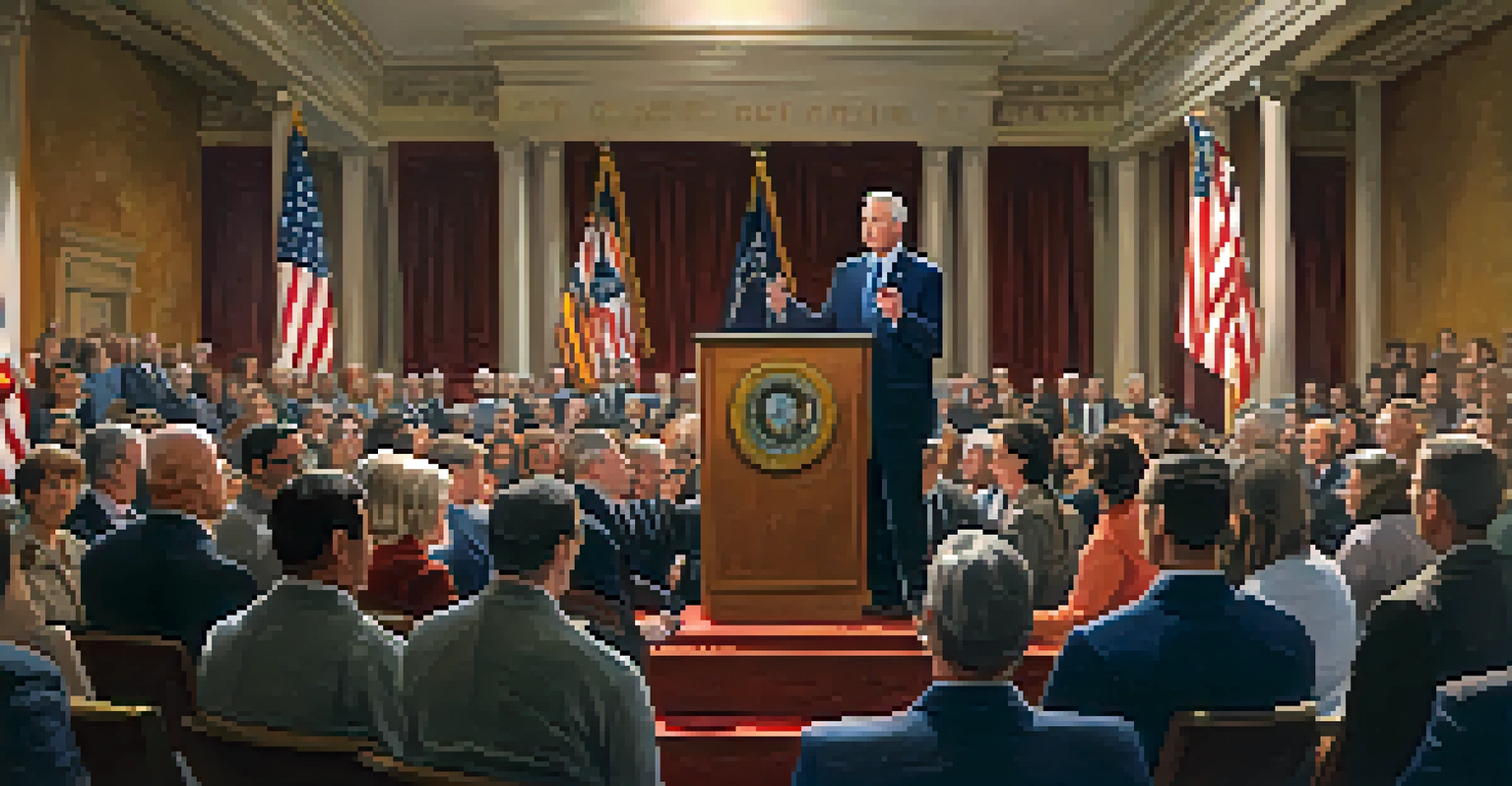The Role of the Governor in Washington State's Governance

Overview of the Governor's Office in Washington State
The Governor of Washington State serves as the chief executive officer, overseeing the state's executive branch. This position is crucial for ensuring that laws are implemented effectively and that state policies reflect the needs of the citizens. Washington's Governor is elected to a four-year term and can serve two consecutive terms, allowing for continuity in leadership.
The Governor's role is to lead with vision, to inspire confidence, and to act decisively when the moment calls for it.
The Governor's office is responsible for a wide range of functions, from managing state agencies to proposing budgets. This role requires a balance of political acumen and administrative skills, as the Governor must navigate complex relationships with the legislature, local governments, and various stakeholders. By setting the agenda for the state, the Governor plays a key role in shaping public policy.
Additionally, the Governor represents Washington in various national and regional forums, advocating for the state's interests. This representation is vital, especially when it comes to securing federal funding and building partnerships with other states. Overall, the Governor's office serves as a critical hub for leadership and decision-making in Washington State.
Legislative Powers of the Governor
One of the most significant responsibilities of the Governor is the ability to influence legislation. The Governor can propose bills to the Washington State Legislature, highlighting priorities for the upcoming session. This power to initiate legislation is a key aspect of the Governor's role in shaping state laws and policies.

Moreover, the Governor has the authority to veto bills passed by the legislature, which means they can reject legislation that does not align with their vision for the state. This veto power can be a powerful tool, as it encourages lawmakers to consider the Governor's stance during the legislative process. However, an override of the veto is possible if two-thirds of the legislature votes in favor of the bill, creating a necessary check on the Governor's power.
Governor's Role in Legislation
The Governor can propose bills and veto legislation, significantly influencing Washington's laws and policies.
In addition to these powers, the Governor can call special sessions of the legislature to address urgent matters. This ability to convene the legislature outside of the regular session allows for timely responses to pressing issues, such as natural disasters or economic crises. In this way, the Governor plays a crucial role in legislative dynamics.
Executive Powers and Administration
As the chief executive, the Governor oversees state agencies and programs, ensuring they operate efficiently and effectively. This includes appointing directors for various departments, such as health, education, and transportation, who implement the Governor's policies at the ground level. These appointments are vital for maintaining a cohesive approach to governance.
Leadership is not just about making decisions; it's about making a difference in the lives of the people we serve.
The Governor also has the power to issue executive orders, which can have significant implications for state operations. For instance, an executive order may be used during emergencies to expedite resources or implement health mandates. This flexibility allows the Governor to respond quickly to changing circumstances, demonstrating the importance of strong leadership in times of crisis.
Furthermore, managing the state budget falls under the Governor's purview. The Governor proposes a biennial budget to the legislature, outlining spending priorities and revenue sources. This budget proposal is a reflection of the Governor's vision for the state, impacting everything from education funding to infrastructure projects.
The Governor's Role in Public Policy
The Governor plays a pivotal role in shaping public policy in Washington State by identifying key issues and advocating for solutions. Through initiatives and legislative proposals, the Governor can address challenges such as education reform, healthcare access, and environmental protection. This proactive approach is essential for responding to the evolving needs of the state's residents.
Additionally, the Governor often collaborates with various stakeholders, including advocacy groups, businesses, and community organizations, to develop comprehensive policy solutions. This collaboration is vital, as it ensures that diverse perspectives are considered when crafting legislation. Engaging with the public helps the Governor gauge community sentiment and build support for proposed policies.
Crisis Management Powers
In emergencies, the Governor has the authority to mobilize resources and implement quick measures to protect public safety.
Public engagement also extends to addressing constituents' concerns and needs directly. The Governor frequently holds town halls, forums, and listening sessions, fostering a connection with the citizens. This level of engagement not only builds trust but also informs the Governor's policy decisions, ensuring they are aligned with the priorities of Washington's residents.
Emergency Powers and Crisis Management
In times of crisis, the Governor's role becomes even more pronounced, as they possess emergency powers that allow for swift action. Whether responding to natural disasters, public health emergencies, or security threats, the Governor can mobilize state resources and coordinate responses efficiently. This authority is crucial for mitigating impacts during critical situations.
For example, during the COVID-19 pandemic, the Washington Governor implemented measures such as stay-at-home orders and mask mandates. These decisions were made to protect public health and safety, demonstrating the significant impact a Governor can have during emergencies. The ability to make quick decisions is essential for effective crisis management.
Moreover, the Governor collaborates with federal and local agencies to ensure a comprehensive response. By coordinating with various levels of government, the Governor can secure necessary resources and support for affected communities. This collaborative approach is vital for addressing complex challenges that require a unified response.
Representation and Advocacy for Washington State
The Governor of Washington serves as the state's primary representative, advocating for its interests at the national level. This includes participating in discussions with federal officials, lobbying for funding, and influencing policies that impact Washington. Through this representation, the Governor helps ensure that the state's unique needs are considered in broader legislative contexts.
Additionally, the Governor engages with other governors across the country, forming alliances to address shared challenges. These relationships can prove beneficial, especially when tackling issues such as climate change, education funding, and healthcare reform. By working collaboratively with peers, the Governor can amplify Washington's voice in national conversations.
Advocacy for State Interests
The Governor represents Washington at the national level, advocating for funding and policies that address the state's unique needs.
Furthermore, the Governor plays a critical role in fostering relationships with local government leaders. By collaborating with mayors, county executives, and tribal leaders, the Governor can better understand regional needs and priorities. This local engagement is essential for creating effective policies that resonate with communities across the state.
The Governor's Influence on State Identity
The Governor's leadership and policies significantly shape Washington State's identity and values. Through their decisions, the Governor can highlight priorities such as sustainability, education, and social justice, reflecting the aspirations of the state's residents. This influence extends beyond politics, impacting the culture and vision for the future of Washington.
Moreover, the Governor often becomes a symbol of state resilience and progress. Their response to challenges, such as economic downturns or natural disasters, can inspire confidence and hope among citizens. By embodying the spirit of Washington, the Governor fosters a sense of unity and pride within the community.

Additionally, the Governor's public communications, whether through speeches or social media, play a vital role in shaping public perception. By articulating a clear vision for the state, the Governor can motivate citizens to engage in civic responsibilities and participate in the democratic process. Ultimately, the Governor's influence extends far beyond governance and into the heart of Washington's identity.